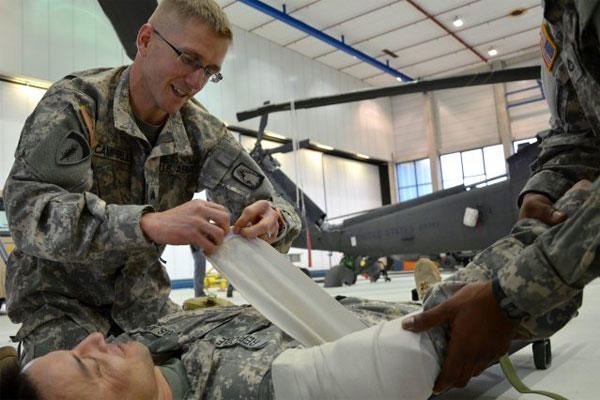LANDSTUHL, Germany - Sounds of a crashing car startled three Soldiers one recent evening as they ran up the steep Kirchberg hillside just west of town.
Tires screeched and metal crunched in the valley below, where Saarbrücker Strasse heads toward Haupstuhl under Autobahn 62's massive highway overpass. Sgt. Roger Adame turned to fellow combat medic Sgt. Joe Campbell and helicopter crew chief Spc. Will Taylor.
"Let get down there, right away," Adame told Campbell. "Maybe's there's something we can do to pitch in and help out."
They sprinted down the hillside to find some people gathering at the scene, although no one seemed to know what to do, Campbell said. The Soldiers, assigned to Company C, 1st Battalion, 214th Aviation Regiment, set to work.
The driver, a German woman in her early twenties, felt neck pain and had cuts on her hands. Taylor, a former firefighter, set up warning triangles and waved off traffic. From the rear seat, Campbell reached forward and stabilized the woman's spine. The driver's door was crushed, impeding his ability to check further. Adame, who served downrange with Campbell during their last tour in Afghanistan, fashioned a makeshift brace for the woman's neck.
"I was able to do so using trauma sheers, sterile bandaging and a car visor," Adame said, in a written account afterward.
The setting sun often blinds drivers heading westward, likely a factor in the Oct. 1 accident, said Thomas Jung, 46, a mechanic who's served as Landstuhl volunteer firefighter for 28 years. Landstuhl paramedics got the call at 6:04 p.m. and were at the scene six minutes later, Jung said. Meanwhile, Campbell was trying to keep the woman calm, to avoid shock, he said.
When German paramedics arrived, they didn't expect to see a Soldier in the car, supporting the woman's neck and talking calmly to her, Jung said.
"We were surprised to see he was sitting in the car," Jung said. "It was very good when he talked with her, so she felt like she was not alone. This is the best thing you can do."
Using the Jaws of Life, a hydraulic tool that tore into the car's roof, German rescuers got her out while Campbell continued to support her neck.
Beside the high autobahn overpass, there is a steep grassy patch amid the forested hillside. Soldiers call it a "fire break," but it's really an area where a pipeline runs through. It's where they run their "gut check," a tough set of four uphill climbs that can take Soldiers up to an hour and leaves them exhausted. Once the woman was safely on her way for further care, the Soldiers returned to training -- finishing one more run up the steep hill.
"Being in an Army (physical training) uniform gave the German public and responding agencies a shining example of who we are as Soldiers, medics and Americans," Adame said, in his written account. "Sgt. Campbell truly demonstrated that we are proud of the corps of noncommissioned officers and do, at all times, conduct ourselves so as to bring credit upon the corps, the military service and our country."
Company C, an aerial medical evacuation company known affectionately to combat troops as "Dustoff," has specially equipped Blackhawk helicopters. In Germany, they support U.S. training mission at posts in Bavaria. But they can respond worldwide. Last year, they returned from a tour in Afghanistan. During the recent winter, they flew humanitarian missions in snowbound Montenegro.
Now, the Soldiers have been recommended for an award for their efforts. The Soldiers' actions exemplify what's expected of them, said Capt. Damien McGuigan, the Company C commander.
"Our medics are Soldiers first. They train to react to any situation which may need a calm head in difficult circumstances," McGuigan said.
While the event sounds heroic to some, Campbell shrugs off the idea that they did anything more than what the Army has trained them for - keep the patient safe, avoid further harm and provide initial care.
"We knew what to do, because this is our job. We don't mind helping out," Campbell said. "Everyone in this company is good at handling emergencies and staying calm when there's a lot pressure, they routinely do that. So, it's not anything out of the ordinary."





























